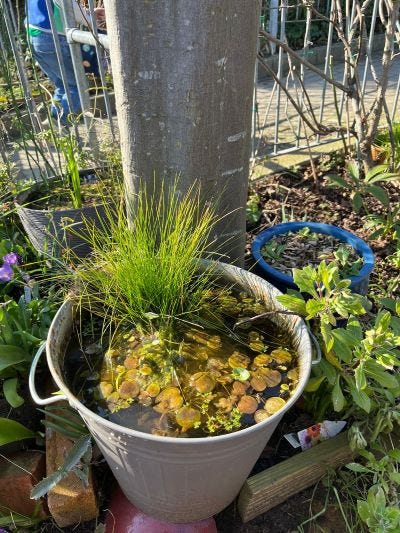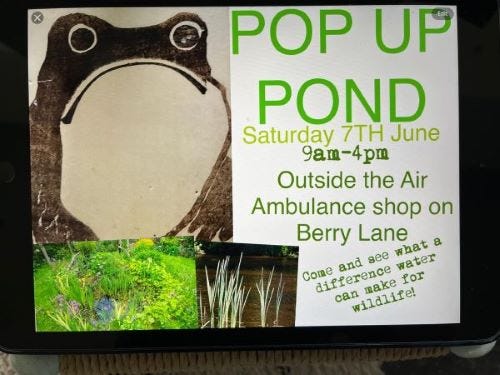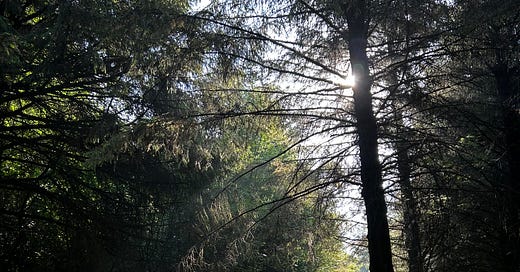Welcome to the LEG Midsummer newsletter
June marks the start of summer proper, with myriad and vivid shades of green in hedgerows, meadows and fields. The air carries that sweet summer fragrance, with golden sunlight dappling through leafy canopies. Honeybees and bumblebees dance from flower to flower, their legs heavy with pollen as they gather precious nectar. Iridescent dragonflies dart around local ponds and tarns on Beacon and Longridge Fells. Delicate ferns unfurl their intricate fronds, wild bilberries swell and ripen in the warm sun, yet it is the majestic Foxgloves that take center stage among the wild flowers, their tall spires of purple-pink bells standing sentinel in woodland clearings.
June brings us the longest day with summer solstice, offering a moment when we become more aware of the sun's ancient rhythms, of the seasons turning through the wheel of the year, and of traditions that connect us to our ancestors. For those who came before us, this pivotal change of seasons was woven deeply into their lives, their beliefs, and their values, a celebration of light and life's abundance.
What a wonderful part of the world we live in.
We are also very excited to have a full calendar of events and activities this month, something we hope for everyone to take part in. We look forward to seeing you, your friends and family.
Foraging in June: Elderflower (Sambucus nigra) – A Scent of Summer
Following on from last month’s piece on what to forage in May we want to continue this theme over the next few months. In this interesting podcast renowned forager, herbalist and author of The Wilderness Cure, Monica Wilde highlights the multiple health benefits of eating foraged foods and in conjunction with Bradford University, through the Wild Biome project, is researching the impact of wild foods on our diet.
This month we are featuring elderflower, the flower of the elder tree. With its distinctive creamy-white blooms and sweet floral scent, elderflower is a favourite among foragers and wild food lovers . Look for elder trees along hedgerows, woodland edges, parks, and rural roadsides. The flowers bloom in flat-topped clusters and are best picked on a dry, sunny morning when their scent is strongest.
Identification: Both the Woodland Trust and Wild Food UK provide useful guidance for identification or Elderflower. If you identify it by the whole tree then it is not easy to get confused with other species however the flowers could potentially be mistaken for cow parsley, hog weed and the highly toxic hemlock. Elderflower though has a very distinctive scent and flower shape. Note also that only the flowers and later berries are edible—other parts of the plant are toxic if eaten raw.
Tips for Harvesting:
Pick only fully opened flowers
Avoid those turning brown or with bugs
Don’t overharvest from one plant—leave enough for pollinators and berries later in the year
Uses: With their sweet scented aroma, elderflowers are commonly used to make delicious cordial, elderflower champagne, jellies and syrups and infused in gin or vinegar. You can also make elderflower fritters, a sweet treat which is a perfect accompaniment to vanilla ice cream and perhaps a drizzle of elderflower cordial. And if you fancy an even sweeter treat try making Elderflower Delight, a British twist on a Middle Eastern favourite.
Disclaimer
Our aim is not to provide comprehensive identification of the plants we feature, instead point you to some useful resources to help you get to know each plant’s characteristics, where you might find it, what plants it could be confused with and hopefully inspire you with ideas for bringing it into your diet. As ever please check with a medical professional your own personal suitability for eating any plant we feature.
Active Sunday - May
We had beautiful weather for our May Active Sunday meet, where we tamed our wildflower verge on the Rec, collected a bag of litter, and gave a willow tree a severe pruning to give our little cobnut tree room to grow in the community orchard!
Suggested activity for June
Seek out a summer wildflower you've never noticed before, and gift yourself the quiet pleasure of really observing, the structure, colour, and growing habit, before identifying it through online or book resources. Discover the tapestry of historical meanings, emotions, myths, legends, and traditions that we have associated with your flower. As contemporary research reveals, the more deeply we understand and connect with the names and cultural significance of plants and flowers, the more powerfully we're moved to protect and nurture the intricate ecosystem we all share.
Big Green Week
Pond Pop Up - Outside Air Ambulance, Berry Lane, Longridge - 9am - 4pm
Come along with family and friends to this event for Big Green Week to dive into the magic world of ponds and see what can be created whatever outdoor space you have available. We also welcome volunteers to either to help set up at 9 am or dismantle at 4pm’s and any offers of containers, potted plants, pond plants are appreciated.


Film Night Weds 11th June - Longridge Library, Doors Open 6.30pm for 7pm start, Entrance: Donations welcomed
We are delighted to be showing Radical Love in conjunction with Friends of Longridge Library, Sophia Sanctuary and Fairsnape. This will be the first showing of films in the library who hope to have regular film sessions, so delighted to be supporting.
Radical Love: the life and legacy of Satish Kumar, a film by Julio Hey about love and forgiveness, about activism, optimism and hope.
Satish Kumar is a former-monk, activist, author, and educator. He has been inspiring global change for nearly 70 years. At 18, he left the monastic order to follow Gandhi’s ideas of a more inclusive spirituality that fights against injustices and exploitation. He was the editor of Resurgence magazine for over 40 years. In 1991, he founded the Schumacher College, in Devon, a College now recognized worldwide as a leading establishment for education on sustainability.
The library are looking to have books by Satish along with other green themed books available for loan leading up to the film and through Big Green Week
Library doors open at 6:30pm Film starts at 7pm. There will be a request for a small donation on the night to support the filmmaker.
Other Events in June
Saturday June 14th- Social Saturday Walk and Talk, meet at Brock Bottom car park 10am
Sunday June 22nd Pop-up Cafe Thornley Old School, discussing improving local biodiversity. 10am meet
Sunday June 29th - Active Sunday John Smith's Playing field, planting rock gardens. 10am meet.
Monday 30th June - Meditative Evening - Lee House, Thornley, 7-9pm: The theme of this event is Reconnecting to Earth, Air, Fire & Water. All are welcome. Entrance: donations welcomed.
Keep in Touch
A reminder that you can …
And we look forward to connecting at our next Social Saturday and Active Sundays. Details will be shared via our LEG WhatsApp
Supporting LEG
For time and other reasons, we are aware that not all can join our activities, so we have made it easier to support us with a donation. Simply use the QR code below and you will be taken to our Stripe page where you can donate. All gratefully received, no matter how small.
Thank You
Thanks for reading our LEG Newsletter!








